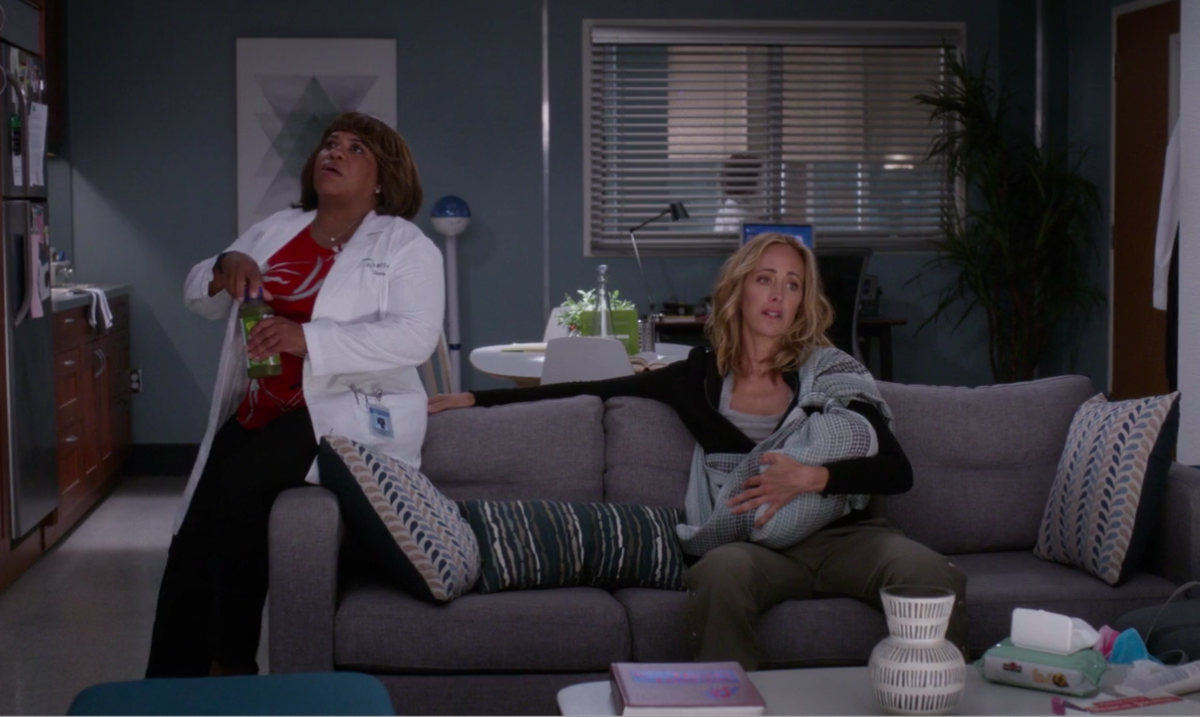“For what it’s worth, I hated maternity leave, too. And I am an excellent mother.”
Dr. Miranda Bailey drops this line in the premiere of Grey’s Anatomy’s 16th season. She’s speaking to new-mom Teddy Altman who’s hanging out in the hospital with her newborn on her maternity leave. Dr. Altman’s both bored and overwhelmed, struggling to meet her baby’s needs (diapers are tricky, babies need to eat all the time, and you can forget about sleeping) and her own expectations (aren’t women supposed to naturally love the opportunity to take care of their babies full time?).
This episode premiered just a few weeks after I’d given birth to my second child. Watching it on my own leave, I couldn’t help but relate to Altman. She acknowledges her privilege, saying “There are women the world over who would kill for the privilege of being able to stay at home with their newborn baby and know that they have a job to come back to.” And then she adds, “I know that I should be grateful, but I hate it… I have a brilliant mind with no opportunity to use it.”
Early motherhood is so physical — it’s about feeding, cuddling, worrying, and diaper changing. I’d describe these tasks as somehow hard and boring. I’d forgotten what it’s like to spend all your energy caring for a little creature who can’t so much as smile for six+ weeks. And that’s not counting the physical roller coaster that is life in the weeks after giving birth. It’s not for the faint of heart. It’s also not something that most professional experiences prepare you for. Mine certainly didn’t. Writing, working in an office, running my own business — none of those things gave me a leg up. You can’t set goals or project manage or write a beautiful phrase to nurture a newborn. You just have to be physically there and let concepts like “return on investment” leave your brain or you’ll go crazy.
Since this was my second, I knew some things about baby care. I’m a skilled swaddler and diaper changer. I know all the breastfeeding tricks. I even know, in my body and mind, that this phase will pass. That the baby will turn into a toddler and then a kid. I know the specific sweetness, the sorriness, and the joy of childrearing. And yet, I still felt overwhelmed, exhausted, bored, and helpless, all combining to give me the distinct impression that I was failing. Watching this episode, I marveled at Bailey’s confidence. I longed for the day where I too can say “I’m an excellent mother” and believe it.
Bailey’s been a force from day one. She might no longer be “The Nazi” but she’s still the hardass I root for even when she’s wrong (see the episode this season where she originally refuses to help Meredith keep her medical license — I was with her the whole way). Bailey’s son is also in high school. She’s had some time to grow into her maternal role. When she was a pregnant resident or divorcing her husband, she was noticeably less confident. Nonetheless, there she was, in season 16, loudly declaring her skill as a mother. It was classic Bailey — from a different character it could read as arrogance, but from her, it was just a statement of fact, a reminder of who she is.
A few episodes later, Bailey learns that she’s pregnant again and the doubts start to creep in. The pregnancy hormones make even the chief of surgery burst into tears. Her feet are swollen, her body tired. She wonders if she’s crazy to be doing this again. Our hyper-competent heroine seeks out also-pregnant Dr. Amelia Sheppard for advice. The pairing is telling. Sheppard often feels lost and out of control — she’s the opposite of Bailey. But she imparts some tricks (like pressing your tongue to the roof of your mouth to stop the tears) that Bailey desperately needs. Pregnancy is the great equalizer. It turns out that a new baby is enough to rattle even the most self-assured women and mothers.
This season of Grey’s has zeroed in on motherhood like never before. Grey, Sheppard, Altman, and Bailey, four of the show’s six leading ladies, have all had plot points about motherhood. In a show with this many seasons and this many couples, we’ve seen pregnancies and babies, miscarriages and abortions, but something feels different now. It’s not just the sheer number of mothers, it’s also the show’s willingness to dive into the realities and nuances of what it looks like to be a high-achieving, working mom.
You see in seasons past, we’ve generally had one pregnant doctor at a time, first with Bailey and later with Callie Torres (miss you!), Meredith (she’s three kids in), and April Kepner (pregnant twice). But when more than one character is pregnant/caring for a newborn at a time, you get to see the diversity in (professional) women’s experience. You get to see how their personal strengths and weaknesses play out in the context of motherhood.
Watching these admirable women struggle, I am comforted. They may be world-class surgeons but their mothering is not Instagram-perfect or an all-fulfilling, sappy, emotional quest. It’s a meaningful part of who they are but it alone doesn’t define them. It’s a rare and nuanced depiction. It’s also one of the only portrayals of motherhood that makes me feel both seen and hopeful.
I find Bailey aspirational in so many ways, including the way she claims motherhood and the way she’s redefining it for herself. Watching this season, I’m not just rooting for her, I’m rooting for myself and all the moms out there (both in and out of Seattle Grace). Let us all be able to declare, truthfully, that we are “excellent mothers.”

